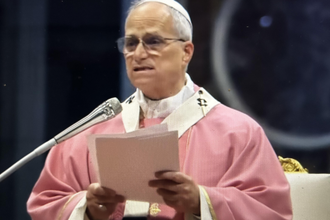Indebted to one another- the Global debt crisis in a year of Jubilee

As we begin a new year the state of global nutrition is dire, with 2.8 billion people unable to afford a healthy diet. Good nutrition is essential yet global food insecurity has increased. Extremely cost-effective nutrition interventions such as micronutrient supplements and breastfeeding support are well established, however, high levels of debt owed by low-income countries (alongside low levels of Official Development Assistance (ODA) from wealthy countries) starve these interventions of investment.
In fact, vulnerable countries are starting the new year drowning in debt, while malnutrition runs unchecked. The countries most affected by food crises pay just over $40 billion in external debt repayments - on average, almost twice the amount that they spend on health services. It is a sad fact that high levels of public debt owed by many lower-income countries means they can't afford the resources they need to provide adequate nutrition and basic services such as nutrition, health and education. The 16 countries most affected by food crises spent around 16% of government revenue on external public debt service in 2023. The number of low and middle-income countries in debt crisis has more than doubled since 2015: 54 countries are now in debt crisis compared to 22 countries in 2015.
Reforms to the global financial system - and UK law - are urgently needed to tackle this debt crisis. 90% of foreign debts owed by the poorest countries are governed by English law, making the UK uniquely placed to ensure that loans to lower-income countries are lawful, transparent and protected from unfair claims. But to date the UK has taken minimal steps to make this a reality.
The existing G20 'Common Framework' for debt restructuring was agreed in 2020 to support 73 Global South countries with debt relief and restructuring, so that they could maintain essential spending. But it is not working in practice. . For example, in November 2022, Chad became the first country to complete the Common Framework process, but its debts were not reduced at all, and in 2025, the country is scheduled to spend 18% of government revenue on external public debt service. A new, legitimate United Nations-backed system that focuses on reducing poverty and inequality is urgently needed.
The UK Government has recently argued for reform of the global multilateral system. The UK plays a central role in the global debt system, and thus possesses a special responsibility to pursue its positive transformation - a responsibility the UK has not lived up to so far.
It is clear that UK should take action domestically and globally. As 90% of foreign currency bonds owed by the poorest countries are governed by English law, the UK occupies a unique role in the global sovereign debt system. To stop creditors from exploiting debt crises by taking legal action against governments in debt distress, UK law should be updated to cover all internationally agreed debt restructuring, and to ensure that loans to low-income countries are transparent and lawful.
It is to be hoped that the UK will use its influence to push for new UN debt restructuring and debt cancellation mechanisms, as the current 'Common Framework' established by the world's largest economies is not addressing the debt crisis faced by the world's poorest countries.
The UK should also promote the creation of a UN sovereign debt restructuring mechanism, along with a UN automatic debt cancellation mechanism for low-income countries affected by economic shocks or emergencies.
You can take action here with Results UK by getting your own MP involved in the campaign.
https://results.org.uk/news/debt-justice-to-end-malnutrition/
In his message for the 57th World Day of Peace, 1st January 2025 Pope Francis says: "I have repeatedly stated that foreign debt has become a means of control whereby certain governments and private financial institutions of the richer countries unscrupulously and indiscriminately exploit the human and natural resources of poorer countries, simply to satisfy the demands of their own markets….. In the spirit of this Jubilee Year, I urge the international community to work towards forgiving foreign debt in recognition of the ecological debt existing between the North and the South of this world. This is an appeal for solidarity, but above all for justice."
In his invitation letter to mark the 2025 Jubilee, Spes Non Confundit ('Hope does not disappoint', Rom 5:5), Pope Francis reminds us that "hope should be granted to the billions of the poor who often lack the essentials of life" and that "the goods of the Earth are not destined for a privileged few but for everyone." Inspired by this profound call to justice, Caritas Internationalis, together with faith-based and civil society organisations, invites all people of goodwill to join their campaign, Turn Debt into Hope. Together, we urge decision-makers to prioritise people and planet over mere profit.
Caritas International says that the Jubilee Year of 2025, 'presents a critical opportunity to drive faster, bolder action to address the escalating yet silent debt crisis that affects governments and billions of people worldwide. Decades of hard-won progress in the fight against global poverty are now being undone, exacerbated by the pandemic, crippling public debts in the Global South, conflicts and climate shocks.'
You can take action here: Turn Debt into Hope: https://turndebtintohope
CAFOD too asks us to take action for the Year of Jubilee in 2025, describing the actions people across the world are taking in uniting in solidarity to demand action on the global debt crisis.
You can read more here: https://cafod.org.uk/campaign/the-new-debt-crisis
But perhaps Pope Francis should have the last word in 'turning debt into hope' on this Day for World Peace:
"The cultural and structural change needed to surmount this crisis will come about when we finally recognize that we are all sons and daughters of the one Father, that we are all in his debt but also that we need one another, in a spirit of shared and diversified responsibility. We will be able to 'rediscover once for all that we need one another' and are indebted one to another."


















